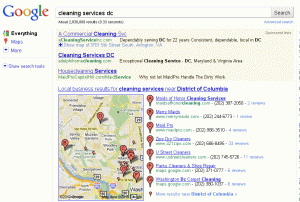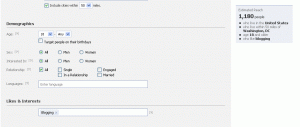When Google decided to start showing local business results on Page 1, it basically meant that A. small businesses who were already thinking about marketing through organic search needed to start thinking more carefully about the impact of local results and B. that small businesses who weren’t using search as a marketing tactic had better start.

Local results on Page 1 of Web search
There are a variety of great resources that discuss on-site considerations when it comes to optimizing for local search. TopRank has a nice blog posting on optimizing for local search and running a query for optimizing AND “local search” will show you a number of other results (on a side note if a search marketer has figured out how to get their content at the top of Google for queries like optimizing AND “local search” then it’s probably worth reading the article).
I want to focus more on some external considerations for how to build online equity once you have your on-page ducks in a row.
Getting a seat at the table
To begin playing, you first need a seat at the table. To show up in local search results, your site need to be recognized by the engines as being associated with a business in a given locale. Google, Yahoo! and Bing all have processes in place to help businesses get get included in the local listings and associated with a given locale. If you’re validated with Google and use Google Webmaster tools, you can also associated your site with a given location.
There are some who recommend submitting your business information to Acxiom or InfoUSA because a lot of the local engines and directories license data from these providers although I’m not entirely sold on whether there is much value in going through these middle-men. For one, they will actually sell your information to marketers so you can expect your aggravation level to increase as you get more cold calls and direct mail. For two, if you need to make changes to your business information you should know that the best way to make sure those updates are propagated on the search engines and directories is to to go directly to the source.
The other side of this is that Acxiom and InfoUSA will apparently get you onto more sites however after Google, Yahoo! and Bing I feel like you quickly get to the point of diminishing returns.
Raising the stakes
Once your site has been associated with a given locale, a lot of work needs to be done on-site. As mentioned, there are a number of resources out there. Basically, you should make sure to have local signals on your site so the engines realize that your site is more than just a little focused on the location you want to target.
From an external perspective, you need to start thinking about how to create authority in a localized fashion. Here are some tactics to consider:
Localize your news release – (Disclaimer – I work for Vocus, product manage PRWeb, and will be more professionally and financially successful if you send out news releases with PRWeb) – Consider using local identifiers in your news release. Instead of writing a headline like “Boutique Offers Tips for Spring,” make sure to include a local indicator: “Washington, DC Boutique Offers Tips for Spring.” The local indicator will make it more likely that local audiences will see your release in localized alerts and queries in both the Web and News search engines. The local indicators will also increase the likelihood that local third party publishers will pick-up your story and link back to your site.
Engage local mainstream influencers – It’s pretty important to find out who the local influencers are in your community – the journalists who create stories and have audiences. Most people have a good sense for who the mainstream local influencers are – reaching them is the challenge. However these days, most of them are active on Twitter and/or Facebook. It’s not a bad idea to be diplomatic and engage them in these mediums as a way to ease your way into a relationship with them.
Engage local online influencers – Mainstream influencers shouldn’t be the sole focus of your efforts. For example, I live in DC and our local food guy is Tom Sietsema. Everyone in the restaurant business in DC is preoccupied with Sietsema but at the end of the day he is going to write what he is going to write with little regard for your business. Often times, online influencers are going to be much easier to develop and maintain relationships with and you can be sure that you are going to get link value from the articles they write about your business. Find out who the local bloggers are that are relevant to your business and embrace them, comp them, do whatever it takes to create a relationship because collectively, they can shoot you to the top.
Use localized ad tools – These days, you can microtarget your advertising efforts via Facebook. These are good ways to get more mileage out of link building campaigns actually because you can not only localize your audience but you can also focus on keywords that are likely to hit influencers. For example, there are 1,180 people in the DC area who list ‘blogging’ as one of their interests. How is that for targeted advertising?
 1,180 blogging aficionados in DC
1,180 blogging aficionados in DC
Have some fun – It’s one thing to chat with influencers and ask them to write about you. It’s a completely different thing to hold an event, invite them out and make them your guests of honor. A few years back, a local area promoter Laura Carlson invited me out to an event with a bunch of local bloggers and journalists at a club downtown. Guess what? We all wrote about the event and venue beforehand, to invite our “tribes” to come, and then of course afterward as well. Not only was the club able to reach new audiences through us but there was also a windfall of links that came from the event.
4 Comments on "What small businesses should know about local search"
Frank Strong
July 23, 2010Wait, you work for who? Other than that -- a great post -- and I like the note about putting a location in the headline. I sometimes struggle (as you well know, ahem, argue) between balancing writing for people -- the readers -- and wanting to use proper techniques for search. Local headlines for local search? That's sage advice.
Cheers,
Frank
Disclaimer: Jiyan sits a paperclip toss away from me at work. Smart dude and I've learned a lot from him. Please blog more, bro.
Marcel Cormier
September 3, 2010Local market segmentation is going to be the next big rush in internet marketing and SEO experts. Great post, lots of good information.
Jiyan
December 2, 2010Hey Frank, thanks for the comment. I would love to write more. . .